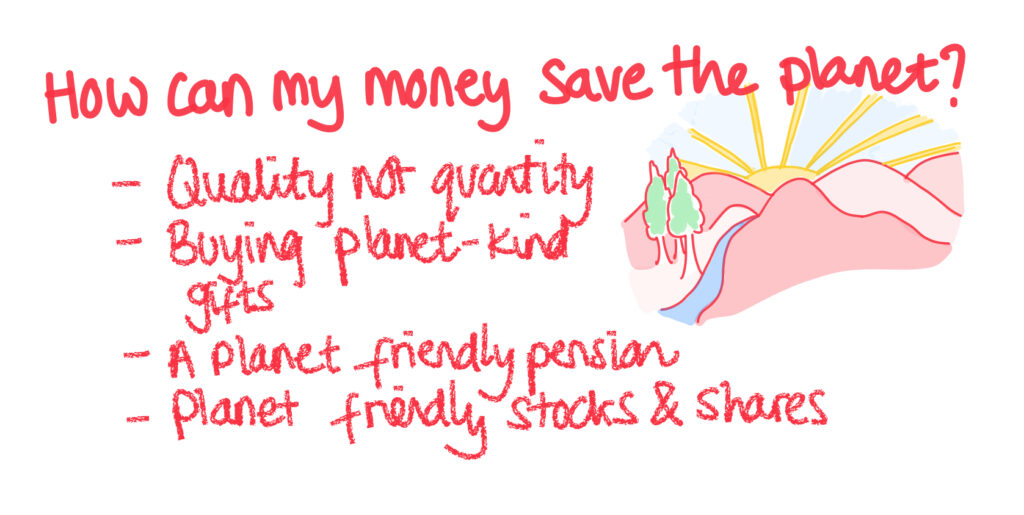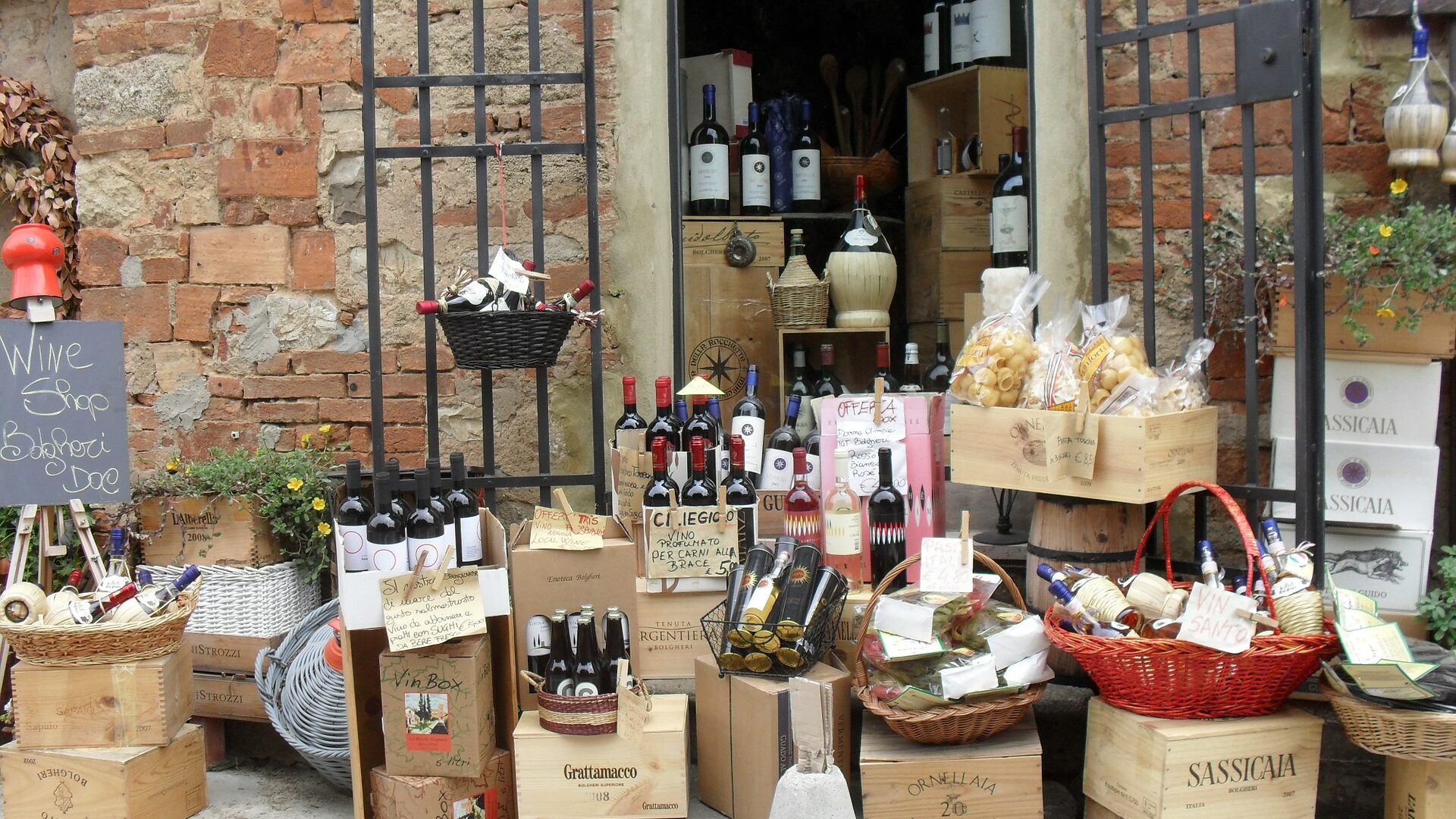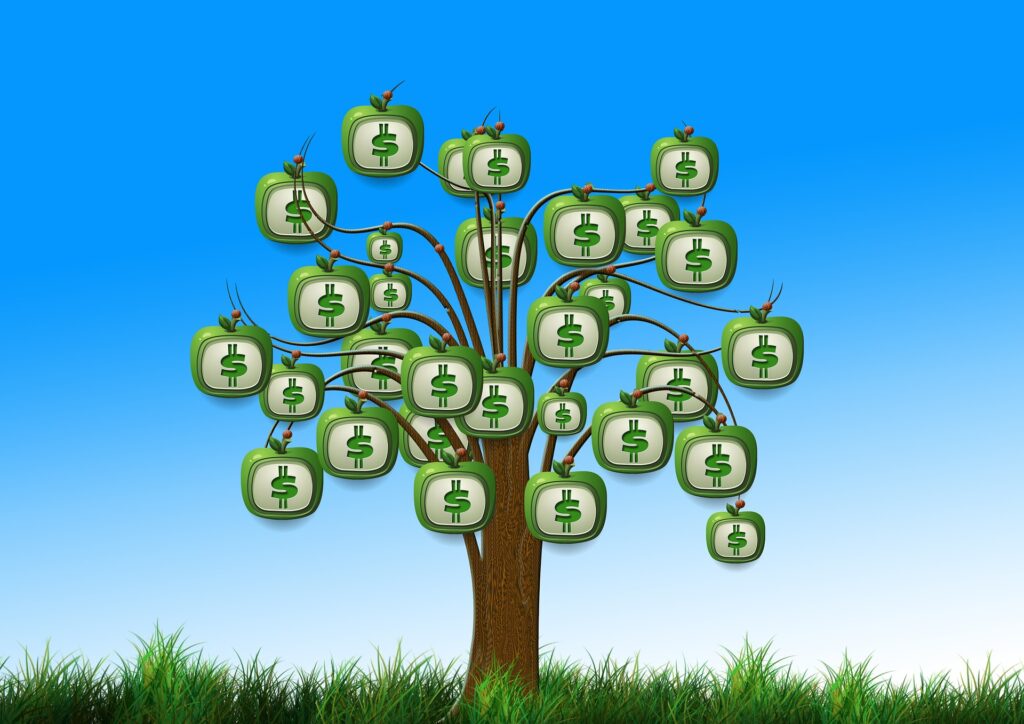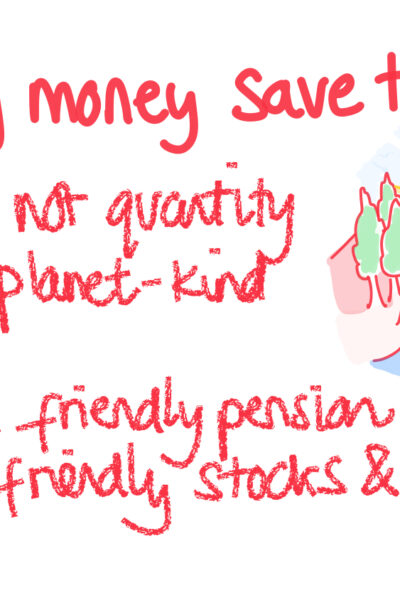We spend money every day- how can we shift our spending to help the environment? How can we make the money we give out have the best impact? To answer the question ‘How can my money help save the environment?’ we’ll look at two types of money you interact with:
- money you spending
- money you own
1. How can your spending money help save the environment?
The environment suffers a lot from the amount of ‘stuff’ in it, and so, the question is how can we adapt spending to reduce the amount of ‘stuff’.

1.1 Buy quality not quantity.
We all know this is the right thing but it’s so hard! A good approach to this is to plan out your spending. If your kettle is on its last legs for example and you know soonish you’ll need a new one. Start setting money aside. Or, you can start setting general money aside every month for these sorts of purchases when they come about. Another good general rule is to avoid plastics, not because plastics in themselves are to be avoided- it’s just usually a sign that it’s been made more cheaply and more likely to break.
Buying quality, not quantity is about a bit more planning. Ask yourself this questions: Will this item last my lifetime? Even if in 20 years your circumstance changes and you don’t need it- if it lasts a lifetime, it will be something you can pass on for someone else to enjoy- not something that needs to go to landfill. There’s a nice blog post from Gone Minimal about buying less and buying higher quality. They list all the benefits of quality not quantity:
- Sustainability
- Saves time
- Saves money
- Less stress
- Increased satisfaction
- Improved style
- More knowledge
- More meaningful relationships
- Increased health
- More happiness
This is such a nice list to read! It’s so true you would feel so accomplished if you had all the items you needed and never had to faff buying things again. It’s hard not to buy- for me the best strategy is not to go into those shops where ‘stuff’ sells itself to you. You know the ones I mean (K-mart, Target, Wilko etc). Steer clear!
1.2 Buy non item gifts.
Gifts that aren’t ‘clutter’ can be just as nice, easier, and are way better for the planet. The purpose of a gift is to show someone they’re special, bring them joy, and sometimes, because of cultural expectations. So think, with these three purposes in mind, what you could substitute out that doesn’t involve clutter.
Small gifts- If you just want to give your friend something to show them you’re thinking of them, you can buy a voucher in the exact amount of their coffee (or cocktail) order from one of their favourite local spots. A lot of cafe’s do this, even if it’s not on their website they might do it if you ring and ask. This is so sweet and thoughtful! Then you can send the voucher code by text or email with a lovely little note.

Another idea is to give them something they love that’s food related- for example, if you know your friend loves mushrooms on toast for breakfast, buy them a bag with a special organic variety pack of mushrooms from the local ethical shop. It’s cute, affordable, personal- and useful.
1.3 Sustainable ‘gifts for the sake of it’
Sometimes you just need a gift. It might be someone you don’t know very well. It might be something you need to pick up last minute. Food gifts are really nice for this purpose. Buy a few food items that go nicely and pack them together, or go into a wine shop and ask for suggestion for a good bottle. Farmers markets are nice for this sort of thing- the more unusual the food item is, the more interesting/special it seems. I find jams/spreads and preserves so handy for this purpose. Most people like them, they don’t contain loads of allergens and they’re small and don’t need to be eaten immediately. Or if you feel like it, you could even make a big batch of a few types as mass gifts to have in store ready to go.

THese sorts of gifts can take a bit more planning. It can be handy to have a little store of things; if you pick up items now and then when you see something out and about, you won’t feel pressured in the moment and the whole process is more relaxed. It’s also nice to have a few pretty tote bags or something you could pack the gifts up in. Buy a stack of cards- charity shops can be hit or miss but quite often do really nice sets of cards and that makes the whole gift look more classy anyway.
1.4 Sustainable bigger gifts
For bigger gifts, depending on the person, you can do a joint gift for a number of friends (eg book a night in an Air BnB somewhere. You can offer your time- I think these gifts are really nice- take someone to a show, take someone for a nice dinner- take your whole friendships group out for someone’s special meal if you can afford it. If you want them to feel special buy them a lovely bunch of flowers. Go for a walk and take coffees and croissants. Depending on the friend- bigger gifts don’t just mean more expense, but can mean more time.
If there’s something you want to buy them, write a note and you can offer an IOU or give cash towards it- for example- An envelope that says, I want to buy you a new desk so your work from home is nicer- let’s go shopping this weekend and choose one. Or- I want to support you in getting a new sofa, big enough for your new family. Here is my contribution, with a cash donation.
If you’re not with that person, buy a brunch voucher from a local cafe and they can go with their partner or child or a friend on you! Or if that’s a bit pricey, send them for a generous coffee and cake.
2. How can the money you own help save the environment?
The money you own (for example in your savings or in a pension) is not sitting in cash in a bank. It’s being invested into the stock market by the bank. If you put in £10, they don’t sit on it- they use it for their investments. Then, when you want it back, they give you £10 out of their pot. Same for when your money goes into a pension. It’s being invested and if it’s being invested into oil and gas, it might not be doing a good job for the planet. The good news is, this is easy to fix.
2.1 Helping the environment with a planet friendly pension
When you put your money into a pension, you are leaving it in the hands of a big pension company. That pensions company works by investing the money into the stock markets on your behalf and over time the value of the money grows in time for your retirement. We’re talking BIG pots of money. And therefore, big power. This is probably the biggest sum of money you will personally handle in your life- and so the first thing is to make sure you’re using it to invest in planet-friendly funds.
It’s really easy to do- I have put a list of resources below to help but, really, it’s simple. You find out the details of your pension provider from HR at your company. Then you ring them and ask for what you want. Once you’ve done it, email your colleagues and give them the info they need to do the same with even less hassle.

2.2 What is a planet-friendly fund?
Think of the aggregate scale of all pension houses in the UK being asked to invest money into ethical funds on behalf of their clients. You can start small by asking for a fossil-fuel-free portfolio. Or there is a name for funds that fall into slightly more ethical areas. They are ESG funds (will have ESG in their name, and that stands for Environmental Social Governance).
They’re funds that preserve our natural world, consider human needs and our interdependencies, and have ethical ways of governing their businesses. This site has some easy to read examples that explain a little more.
It is so powerful because not only are you investing in better funds, you’re taking money out of investment in fossil companies. This sends a trend across the market and puts more pressure on those companies to change. If you’re investing in a company that supports employees and has good mental health/ inclusion/ diversity it will be a better environment for inspiration to flourish. If a company is governed well, they will have a better chance of avoiding pressures for sneaky business deals, and non-transparent interactions or bribes.
There is a movement called Make My Money Matter that encourages people to put their pensions to good use for the planet. They have really great information on how and what to do. Also, it was founded by Richard Curtis who is a writer/producer or director behind Love Actually, Notting Hill, Bridget Jones’ diary, About Time and, Four Weddings and a Funeral.
2.3 Planet friends stocks and shares
If you haven’t got a pension but have any stocks and shares investments, you can do the same! If you don’t work or are still studying and pre-job, discuss this with your parents, siblings, or family friends.
Conclusions: How can my money help save the environment?
So, buy quality, not quantity. Buy non-stuff gifts that are still cute, thoughtful and personal, and still bring joy to the receiver. Quality food is really good for this. Also good, are vouchers for their local favourite coffee spots- or places nearby to them that they might like to try. And for the big money- make sure it’s going into places that are helping, not polluting the planet.
Hope you found these ideas on ‘how can my money help save the environment?’ helpful.
Here are some other posts about sustainability for the planet that you might enjoy:
How climate change works Carbon emissions vs carbon footprint Net zero challenge: heat, electricity, transport How bad is my carbon footprint, really? The role of hydrogen in our future How effective is carbon offsetting?

